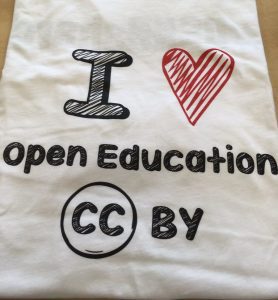by Robin DeRosa, CoLab Director
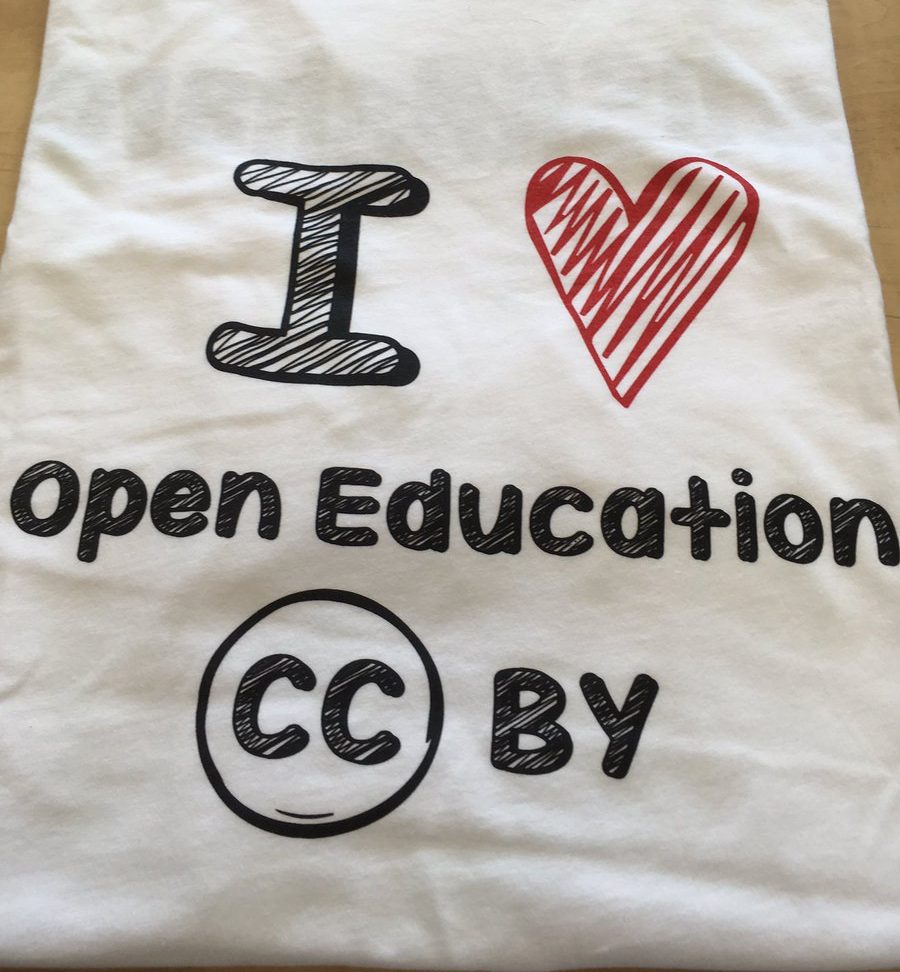
Plymouth State University is committed to reducing the cost of higher education for our students; involving students as active contributors to their scholarly, creative, and professional fields; and making knowledge more accessible to the public. These three commitments are the backbone of open education, an innovative approach to teaching and learning that centers access, engaged pedagogy, and commons-oriented approaches to sharing research. As part of these commitments, PSU faculty and staff are currently participating in two organized initiatives: the USNH Academic Technology Initiative (ATI) and the PSU Cluster Pedagogy Learning Community (CPLC).
The ATI has been running since 2011 as a collaborative effort between Granite State College, University of New Hampshire, Keene State College, and Plymouth State University. For the last four years, the ATI has focused on open education. Instructors from across the system propose projects designed to lower the costs of learning materials, help students contribute valuable work to their fields, and/or widen the impact of university research on the public good; each year forty-five instructors are selected based on the quality and potential of these project proposals, and supported through a year of professional development as they realize their goals. This year, PSU has twelve outstanding faculty and staff members participating as “ATI Ambassadors,” with projects that are truly destined to improve learning and research in our state and beyond. Here’s a quick glimpse into our ambassadors’ plans:
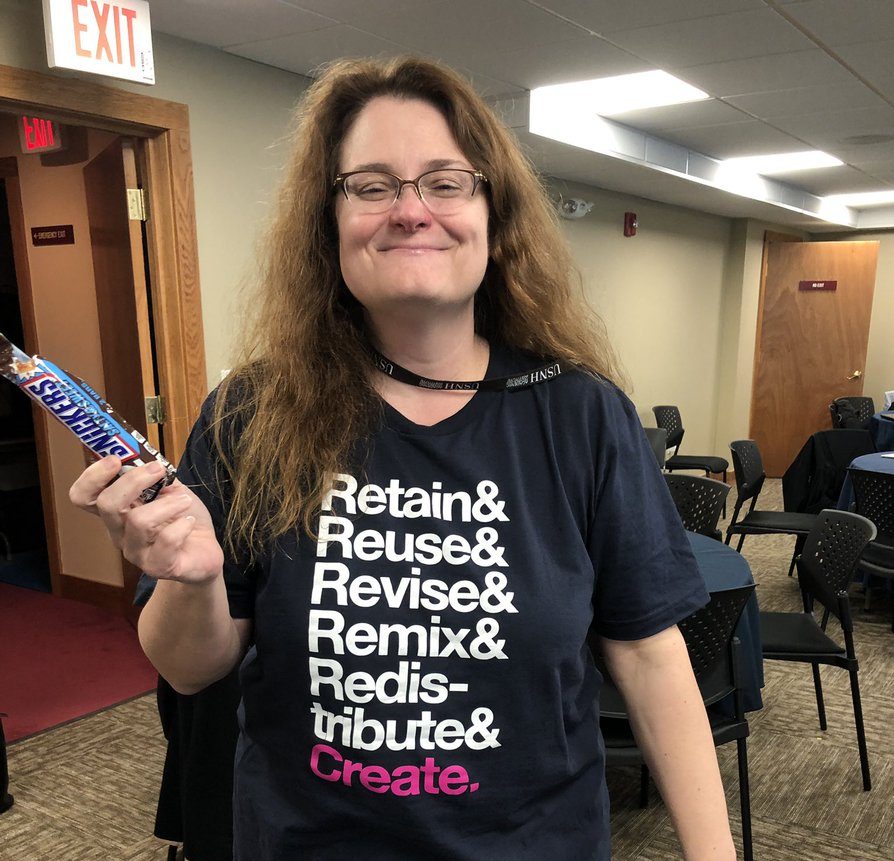
Julie Bernier, Professor of Athletic Training and Chair of Health and Human Performance, will create an open textbook for her Kinesiology course, use a new H5P application to develop interactive learning modules for her “Lower Extremity Injury Assessment” course, and start to build open resources for her “Orthopedic Medical Device” course, for which there currently are no textbooks. Lisa Doner, Assistant Professor of Environmental Science and Policy, will connect faculty and students to professionals in their discipline to identify common skill gaps that are barriers to hiring via her emerging “Pathways to Professionalism” project. Through a series of workshops, demonstration field trips, and job-focused skill-building modules, this project aims to grow student confidence in their disciplinary abilities, establish fact-based expectations for early career jobs, and develop hiring pathways for students in non-medical STEM majors. Kate Harrington, Professor of French, will work with students in her “Diversity of Francophone Communities in the U.S.” course to create a website that highlights the French presence in New Hampshire. Students will research sites of French cultural heritage throughout NH and conduct oral interviews of francophones living in the state to feature on the site. Kate also plans to incorporate practices of open pedagogy to some extent in all of her fall courses! Whitney Howarth, Associate Professor of History, will use open pedagogy and digital tools like StoryMaps and Hypothesis to co-create OER with her students, sharing their insight about the roots of current global conflict using blogs and online domains. Hyun Joong Kim, Assistant Professor of Geography, plans to develop a tutorial workbook for students in the “Introduction to Geographic Information Systems” (GIS) course that is a required course of the GIS Certificate Program. With students’ input, he plans to incorporate local or regional geographic data into the workbook and make more interactive course modules. Phil Lonergan, Professor of Sculpture, is creating a free, openly-licensed resource for the foundations 3D courses. The OER will be co-created with his students this year, and will include technical instructions, video demos, art history and theory, student reflections, and a sample assignment gallery. Kerriann Reynolds, Clinical Assistant Professor of Nursing, will be creating an OER for the “Biochemistry for Nurses” course, which will save PSU Nursing students more than $15,000/year in textbook costs. Susan Sabella, Clinical Assistant Professor of Elementary Education, will be developing open educational resources for her “Language Arts and Reading” course, to support teacher candidates and beginning teachers as they plan and facilitate learning experiences with elementary students in the area of disciplinary literacy. Because visuals support a Universal Design for Learning, she will be using a digital infographic tool to create these OERs for our Elementary Education teacher candidates. Eric Spieth, Faculty Member in Business and Internship Coordinator, will be creating an OER of materials to accompany a new Open Lab course sequence he is creating focused on professional development and internships for students. Laura Tilghman, Assistant Professor of Anthropology, will work with students in “Anthropology of Migration” to create a website about immigration and refugee issues in New Hampshire, using PlymouthCreate, which allows students and faculty to easily create and publish content to the web. This site will serve as a public resource, and provide students with opportunities to learn about writing for the public and basic web design principles.
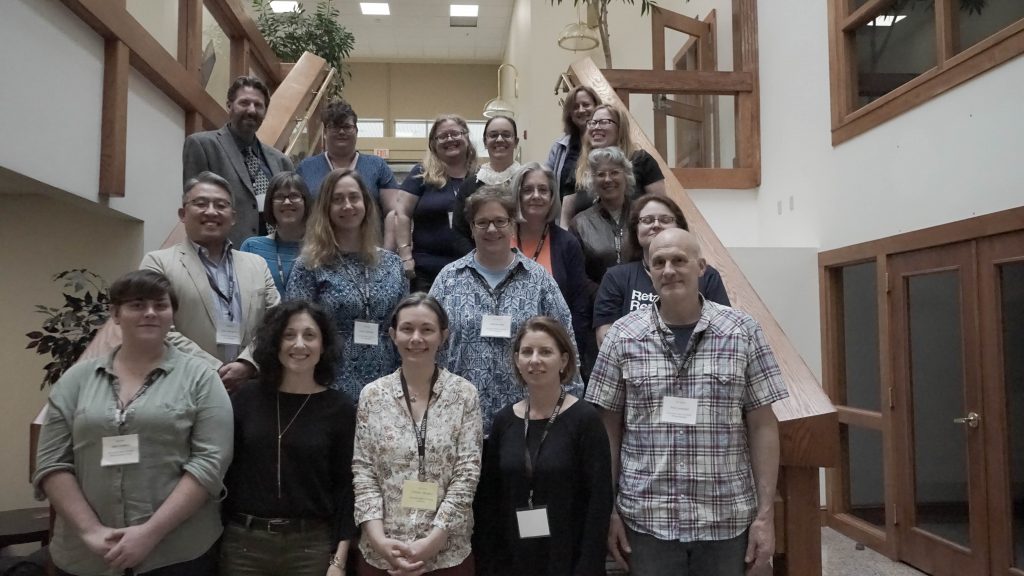
In addition to these ten ambassadors, we are welcoming back two experienced participants, Hannah Davidson from Campus Accessibility Services and English Department faculty member Kristin Stelmok, who will act as mentors to the cohort as they undertake their own projects. Hannah is creating an open web-based guide for making courses more accessible and building materials to help faculty/staff think broadly & critically about inclusivity, and curating/creating how-to resources to assist instructors at our campus & beyond. Kristins’ students from two of her courses (“Feminism in the U.S.” and a themed Composition course, “Gender and American Culture”) will collaborate to build OER that will eventually replace an expensive textbook; the goal of her project is to create opportunities for students to connect with and learn from each other as they build an authentic, valuable, and dynamic “textbook.”
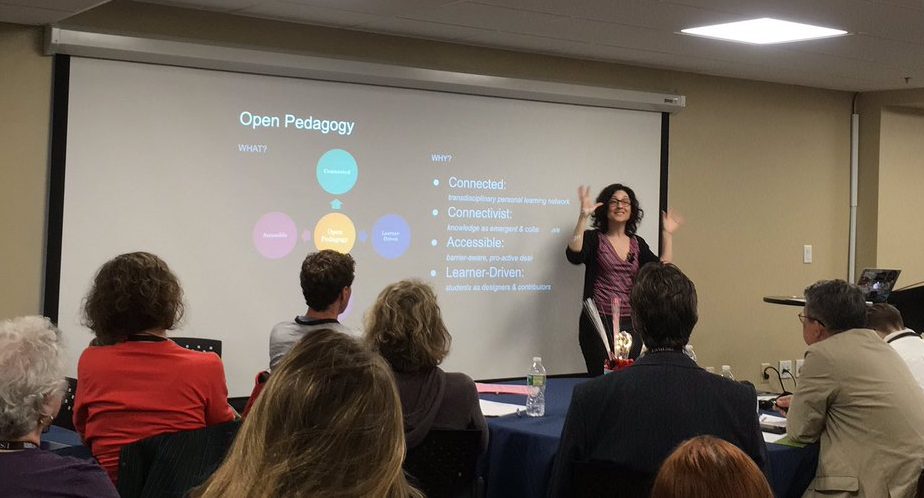
In May, these faculty and staff members attended the Academic Technology Institute, an annual three-day intensive that was held this year at Granite State. I kicked off the event with a keynote address focused on building out our open education initiative in ways
that coherently support our own institutions’ mission statements and on continuing work at a state level with our newly formed New Hampshire Open Education Public Consortium, which includes all of the USNH colleges and each of the seven New Hampshire community colleges as well. We hope going forward that the work we are doing in open education will help complement each
institution’s own goals as well as distinguish New Hampshire as a leader in textbook cost savings. Here at PSU, we are focused on Clusters, and Eric Spieth reflects, “What I learned at the ATI is that this team has powerful, evocative and compelling answers and actions to support the fundamental question of what makes a cohesive PSU signature experience. We have the opportunity to be a catalyst for change in guiding the answer and informing the PSU culture, through creating, defining, communicating, and anchoring such an experience.” We hope to blend our work in open education with emerging and complementary pedagogical models that PSU faculty and staff are developing around clusters.
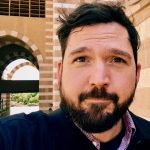
Jesse Stommel, Director of the Division of Teaching and Learning Technologies at the University of Mary Washington, gave the second keynote, and focused on the role of empathy on teaching, including a look at “radical” pedagogical practices that refuse all forms of penalty in the classroom. Laura Tilghman reflects, “The biggest take-away was the focus on the underlying values of our teaching, and the type of experience we want to create for our students to allow them to flourish and come into their own: trust, empathy, understanding, open-mindedness. And letting go of the need to control every aspect of a course before you even meet your students.” Laura is excited to attend a workshop at the CoLab later this summer focused on “ungrading,” one of the practices that Jesse mentioned in particular. Watch for more info coming soon about that!

Our third keynoter was Martha Burtis, who currently runs the Digital Knowledge Center at the University of Mary Washington, but who will join us on campus at PSU in August as our new Learning & Teaching Developer. I think all of us from PSU just kept feeling lucky, as Martha delivered her keynote focused on how we empower students to really own their educations, support each other in their learning, and contribute amazing work to the wider world. Kristin Stelmok reflects, “My biggest takeaway from ATI is that I need to continuously remind myself to really listen to the learners in my classroom and to make space for them to explore, connect, push back, and create.” Jesse and Martha, along with the outstanding Karen Cangialosi, Keene State Biology professor and a national leader in open pedagogy, shared provocations and practical examples related to building more authentic learning environments
and involving students more centrally in the development of their learning processes. Kate Harrington writes, “The inspiring Open
Pedagogy keynotes have encouraged me to rethink not just what and how I teach, but to think about the why. I’m especially thinking about assessment. Most of my students hate studying for and taking my exams, so why I am giving them at all? Inspired by ATI, I plan to rethink my syllabi, classes and the way I structure learning in order to create more meaningful learning experiences for my students.”
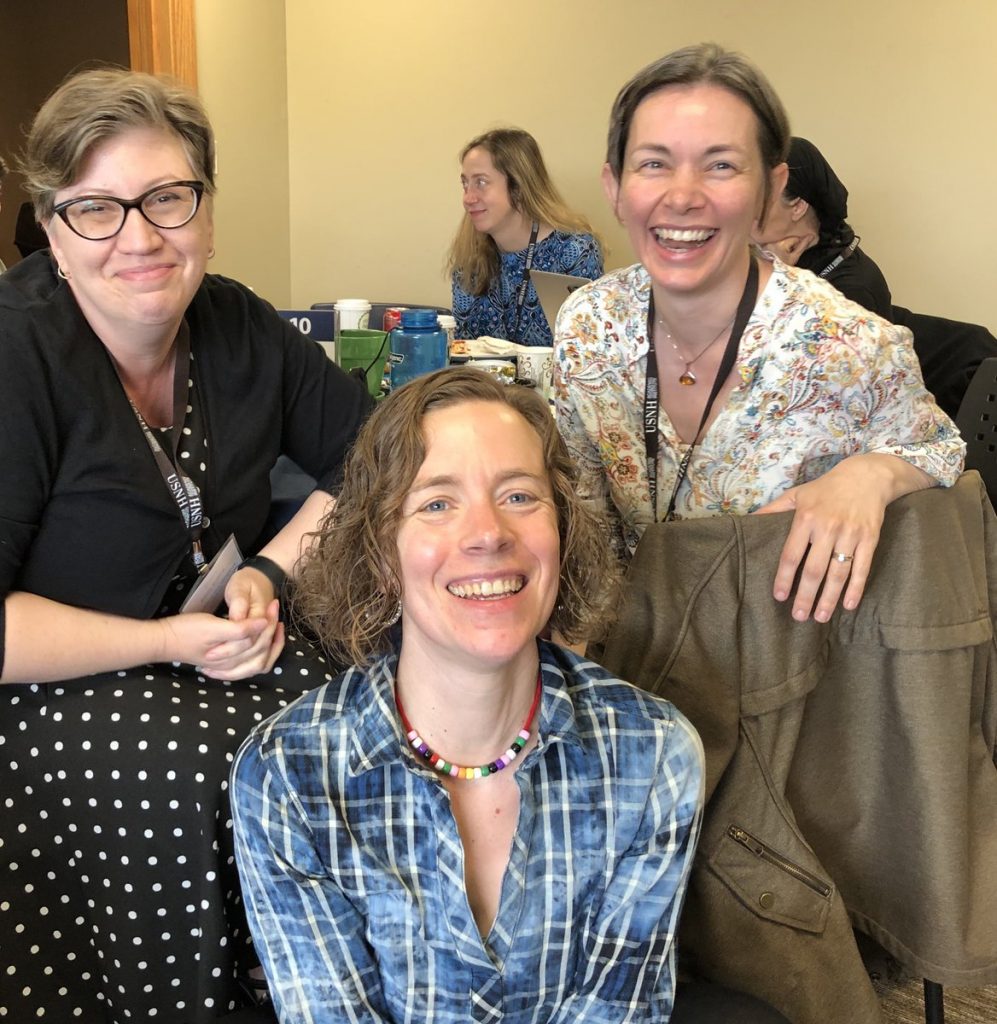
In addition to the keynotes, ATI participants also worked in cohorts on their project plans, collaborated across institutions, and learned about new tech tools and apps that could enhance their teaching. A wide array of support staff presented workshops and presentations on everything from copyright law to publishing with Pressbooks. PSU support folks included: from the CoLab (me and my partner Matthew Cheney), the library (Christin Wixson and Alice Pearman), and Academic Technology (JoAnn Guilmett and Erika Rydberg), and past ATI participants and current students also attended and shared their stories and expertise, including students Jessica Chretien (CoLab Affiliate) and Ryan French during the Open Ed Participant panel and English faculty member Rebecca Grant. What a huge team! Thank you to you all!
The ten ATI ambassadors and two mentors are also part of the Cluster Pedagogy Learning Community, a group of more than seventy PSU faculty, staff, and administrators taking a deeper dive into our own teaching and learning at PSU this year. Generous funding from the Davis Educational Foundation supports the learning community, and in particular, the CPLC’s focus on interdisciplinarity, project-based learning, and open education, the three emerging wings of Cluster Pedagogy. The PSU ATI cohort forms the Open Track of the CPLC, and will take a leadership role in helping the rest of the learning community learn about the potential of open education, including cost-savings around OER and student engagement in open pedagogy.
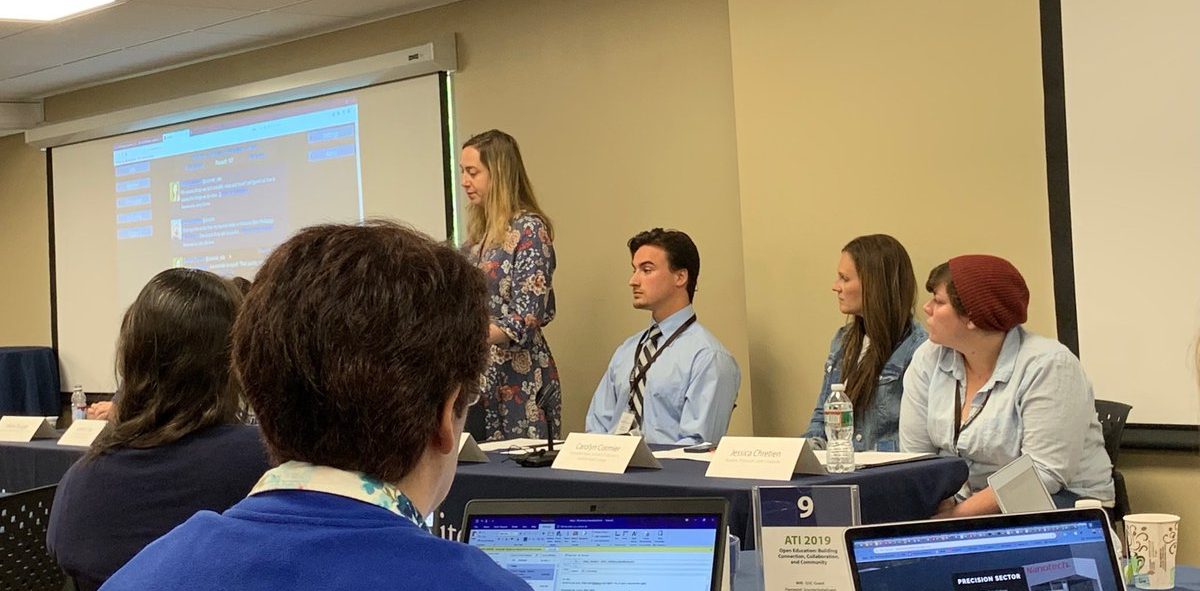
It’s an exciting time for teaching and learning at PSU, and there are many projects and conversations in full swing. I am so grateful to my colleagues for their willingness to explore new paths and to collaborate together to find common commitments. If you’re interested in learning more about open education (such as lowering costs through OER; involving students as contributors to their fields; or increasing the public impact of academic research), reach out to one of the members of the Open Track, or stop by the CoLab anytime. Both the ATI and the CPLC will be running next year, so let us know if you’d like to get involved in the next cohorts!

